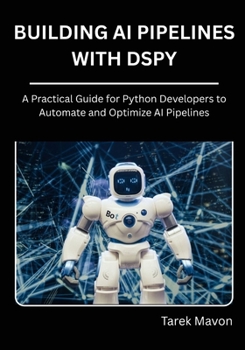Building Ai Pipelines with dSPy: A Practical Guide for Python Developers to Automate and Optimize AI Pipelines
The future of AI development is declarative, modular, and pipeline-driven. DSPy-Stanford's open-source framework-redefines how developers interact with large language models (LLMs). Unlike traditional prompt chaining tools, DSPy empowers developers to build structured, testable, and optimized AI pipelines using Python. As LLMs like GPT-4, Claude, and Mixtral dominate the AI landscape, the need for clear, maintainable, and scalable architectures is critical. DSPy delivers this through a unique combination of Signatures, Modules, and feedback-based tuning. This book is your practical guide to mastering it.
Written specifically for Python developers, Building AI Pipelines with DSPy draws from current research at Stanford's CRFM lab and integrates real-world practices from AI engineers deploying production systems. This guide reflects best-in-class industry insights, emerging trends, and modular design principles that go beyond LangChain and generic prompt engineering.Building AI Pipelines with DSPy is a hands-on, comprehensive guide to building reliable and intelligent AI workflows with DSPy. You'll learn how to declaratively construct language model pipelines, integrate retrieval and reasoning modules, fine-tune prompts using feedback functions, and evaluate your systems for performance, cost, and accuracy. Every chapter includes practical examples that scale from quickstarts to advanced use cases like multi-agent coordination, tool-augmented reasoning, and memory-based pipelines.
Declarative programming for LLM pipelines using DSPy Signatures and Modules
Building production-ready AI systems with GPT-4, Claude, Mixtral, and more
Retrieval-Augmented Generation (RAG) pipelines and evaluation techniques
Integrating external tools and APIs (calculators, search engines, databases)
Agentic workflows, feedback loops, and self-correcting AI patterns
Tracing, logging, debugging, and deploying DSPy pipelines efficiently
A complete glossary, API cheat sheets, and prompt engineering templates
This book is for Python developers, AI engineers, data scientists, and software professionals who want to design smarter AI systems and move beyond prompt-chaining libraries. No prior DSPy experience is needed-but a working knowledge of Python and basic understanding of LLMs is recommended.
Skip the steep learning curve. In just a few focused sessions, you'll be building reliable, modular, and testable AI pipelines without relying on messy prompt engineering or bloated orchestration libraries. By the end of this book, you'll be confidently designing DSPy pipelines that are reusable, extensible, and production-grade.Don't just build prompts-build pipelines.
If you're ready to level up your AI engineering skills and master the declarative approach to large language models, this book is your complete roadmap. Get your copy of Building AI Pipelines with DSPy today and start designing AI systems that are smarter, faster, and future-ready.





